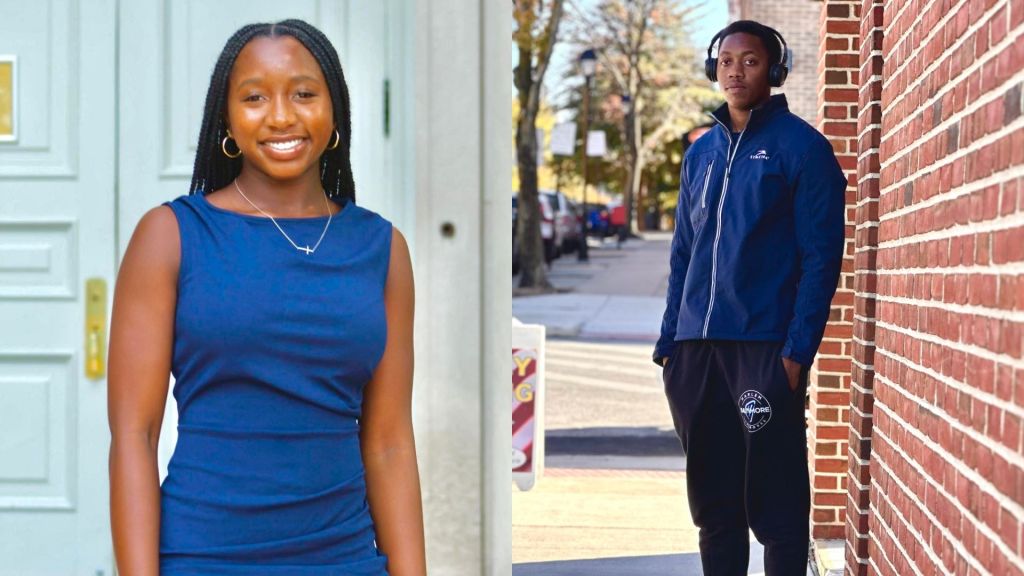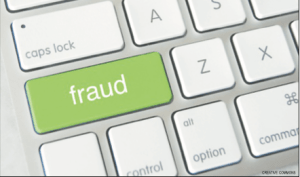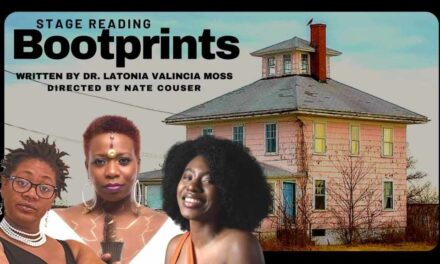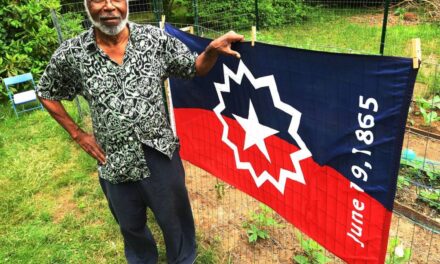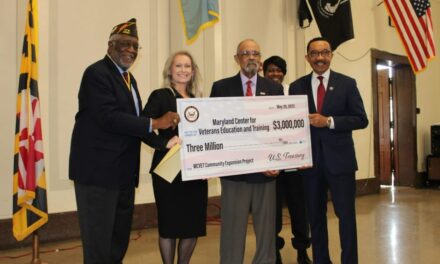By D. Kevin McNeir
Special to the AFRO
Millions of Americans from 18 to 100 and beyond have already submitted ballots thanks to early voting opportunities. While older generations are certainly weighing in on the future of the nation, so are young voters of Generation Z (Gen Z or Gen Zers ).

Kobie Johnson (Right) says abortion and police brutality are top concerns for him this election season.
Kobie PG county voter: AFRO photo / Alexis Taylor
This week, members of Gen Z, many currently pursuing degrees at local U.S. colleges and universities, spoke with the AFRO on being first time voters and their top concerns for the future.
Black Girls Vote: A breeding ground for young, politically astute women
Asia Stanley, 20, a native of Baltimore, Md., is a junior at Morgan State University where she’s majoring in political science and minoring in legal studies.
Stanley serves as the public relations chairperson for the national, nonpartisan, nonprofit organization known as Black Girls Vote, joining the group in 2023. The organization was founded by Nykidra “Nyki” Robinson on Nov. 30, 2015, the birthday of Shirley Chisholm – the first Black woman elected to the U.S. Congress.
Stanley said she voted early, on Oct. 26, along with her mother in search of a “more impactful, civic experience.”
“I’ve always been the political one in my family,” she said. “Voting was a bit underwhelming, since all I did was fill in a few bubbles. Still, I know that my vote has a larger impact than that. I surround myself with like-minded people who have all voted already or who plan to vote.”
Stanley has spoken with others in her age group to make sure they vote.
“When I’ve come across peers who say they don’t plan to vote I try to educate them. Voting is one of the easiest ways to participate in government. Everything is on the line now and it’s important for all of us to vote. There are so many things that we cannot afford to lose or see becoming any worse than they already are, said Stanley. “I’ve been really excited– someone running for president looks like me and represents many of my ideas.”
Among her top concerns are healthcare, funding for classrooms and the curriculums being taught in public education and reproductive rights.
“To succeed as adults, youth need a strong, educational foundation, not one that has been watered down because of books being banned or funds being cut,” Stanley said. “When the government begins to levy restrictive policies or enforce restrictions on women or on lower income Americans, it could lead to a world that’s far more dangerous. When people have few options or have their rights suppressed, they often feel compelled to do anything simply to survive.”
Samiah Sudler-Brooks, 20, who hails from Bear, De., is also a member of Black Girls Vote, now in her third year – her second as a member of the organization’s executive board. A junior at Howard University, majoring in political science and minoring in international affairs, she said she plans to vote in person on Election Day, Nov. 5.
“I’m both anxious and excited about voting – excited because it will be my first time voting but anxious because of the possible results that our nation faces depending on who wins the race for the White House,” Brooks said. “I can say that being a student at Howard in the city that’s the focal point of American politics, and with one of the candidates being a graduate of Howard, I couldn’t be more excited.”
Brooks said some members of her generation are not as enthused about casting a ballot.
“As for my peers, I’d say it’s about 50-50,” she said. “A lot of the Black women from my group plan to vote. Among my Black male friends, most of them have said they don’t care about voting, don’t see what voting will do for them or don’t understand what difference one vote will make. I try to help them see things differently because for me, voting is a right – even a responsibility.”
Brooks said for her, the ability to vote is something her elders taught her to respect.
“As a young Black woman, I have heard stories from my Nana, from Columbus, Ga., who saw Dr. King march. She always tells me ‘your vote is our justice.’ Voting is a privilege that women and Blacks, male and female, were once denied. She reminds me that our ancestors endured a lot and have provided a strong foundation for us. We cannot move backwards –we must move forward.”
Among her major concerns are health care and women’s reproductive rights, affordable housing and supporting public education.
“I believe in health care for all, no matter one’s income. I also believe that abortion should be legal because women should have the right to do what they want with their own bodies.” Brooks said. “As for public education, it’s wrong to eliminate texts and subjects that may make some students feel uncomfortable. History books are coded and often fail to tell the entire story – the whole truth – especially about African-American history.”
“I had to come to Howard University to learn my own history – a history that my teachers failed to provide back home in Delaware,” she continued. “It’s wrong to pretend that Black history begins and ends with Dr. King and Rosa Parks.”
Brooks also weighed in on the immigration issues on the election table.
“I believe that any immigrant who comes to America should be given a pathway toward becoming a U.S. citizen. That’s clear and fair and our government should not hinder that process,” she said. “At the end of the day, we are all immigrants and we all have dreams for a better future for ourselves or for our families that we should be allowed to pursue. After all, America is the melting pot of the world.”
A young man’s perspective
Kobie Johnson, a 23-year-old Prince George’s County, Md. native, spoke to the feelings Black men have expressed this election season.
“Sometimes, it doesn’t always feel like either party has our interest in mind. I understand why Black men, in particular, are especially jaded with the aspect of voting,” he said. “I 100 percent understand, as a Black man living in this country. You feel kind of hopeless sometimes with the issues going on. Literally yesterday, I’m on Instagram and I see this video of a cop shooting somebody right near my middle school in my hometown on Collington Road. It’s hard to put into words how it makes you feel.”
Johnson,who has participated in an election before, said brutality against Black bodies is a concern for him.
“I’ve seen so many instances of police using deadly force, when it just wasn’t necessary in my opinion, it scares me and I hear things like what Donald Trump said after Sonia Massey…about giving police immunity and that terrifies me. That’s why my vote is for Kamala, personally.”
Johnson also said abortion is a key topic for him, even as a male voter.
“I fear for the health of the women I love,” he said. “God forbid they need to prioritize their health before the health of an unborn child by ending a pregnancy to survive and it’s illegal for them to do that. That terrifies me.”
It’s a family affair
Gabrielle Tyndall, 19, from Atlanta, is a youth member of the NAACP, serving on the executive board as the co-chairperson on public outreach. Tyndall, a sophomore at American University, is majoring in international studies and was excited to vote for the first time.
“I first planned to vote in D.C., but my absentee ballot did not arrive in the mail on time and so I called my parents last week and told them I had booked a ticket and was coming back home to vote because I was not going to leave things to chance,” Tyndall said. “We voted as a family: my mother, father and one of my older sisters. My other sister, also older, is in New York, but we all voted on the same day at the same time so we like to say, we voted together. I expected it to be chaotic but besides us, there were only a few other people waiting in line.”
Tyndall had to vote in person because her mail-in ballot was late.
“Back home in Georgia, there seems to be a lot of confusion about how to vote or how to get absentee ballots, which I don’t really understand,” she said. “It’s the reality. So many of my friends, who are in school with me here in D.C. but are from Georgia, all went back home to vote.”
For Tyndall, casting a ballot was a goal long before she could exercise the right.
“I always knew I was going to vote, but about two years ago, I became friends with another young woman whose grandmother was a big activist. She often talked with me about the challenges she and other Blacks faced just to secure the right to vote – and to be able to vote safely. As the election cycle was moving along this summer, and with President Biden dropping out of the race, the first assassination attempt on Donald Trump and Kamala Harris becoming the Democratic candidate, I really became more interested and more vocal about how important it was for anyone who could vote to make sure they did vote.”
Still, she says the voice of another generation was most encouraging.
“Having those conversations with my friend’s grandmother really moved me. That one-on-one conversation really empowered me,” said Tyndall. “Both of my parents immigrated to the U.S. and we never had that conversation like African-American families. Still, I’m pretty much an activist at heart.”
Tyndall’s mother is from Haiti and her father is from Guyana.
“I include immigration among the top of my concerns, but my parents are now both U.S. citizens and have been in America for a long time so it’s not an immediate concern. But when I hear the rhetoric that’s being used to debase and dehumanize immigrants, that really bothers me. How can Donald Trump stand before us and say that Haitians are eating cats and dogs? How can his supporters talk about Hispanic immigrants with such disparaging comments? These are people – real people with real issues who have left their own countries because they need help, they need refuge, they need the chance for better lives.”
Tyndall spoke on how Gen Zers lined the campaign trail for Harris.
“My Gen Z community, especially through social media, has been very active in her campaign. Some of us are creating content, some of us are engaging in TikTok, like on Kamala HQ, or with Jubilee videos,” she said. “I remember how the Black community showed up and showed out for Barack Obama when he ran for president. I hope that we do the same for Kamala Harris.”
As she wrapped her AFRO interview, Tyndall had one last word for the undecided:
“For those who may still be leaning towards Donald Trump, I think that he’s put his foot in his mouth so often–as recently as his rally in New York City– that those who are still uncommitted will have no other choice than to vote for Kamala Harris.”
The post Determined to have their say: Gen Z voters cast ballots for the first time appeared first on AFRO American Newspapers.

